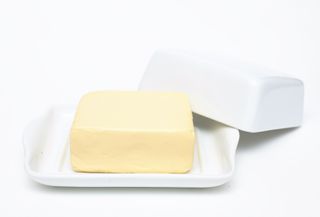
Trans Fat Isn't Evil, Ignorance Is (Op-Ed)

Dr. Mitchell Roslin is chief of obesity surgery at Lenox Hill Hospital in New York. He holds several patents for the treatment of obesity and designed a method for treating relapse after gastric bypass surgery. Roslin has expertise in laparoscopic obesity surgery, duodenal switch surgery and revisional bariatric surgery. He contributed this article to LiveScience's Expert Voices: Op-Ed & Insights.
The recent, but long overdue decision by the U.S. Food and Drug Administration (FDA) to ban trans fats made me think about many of the shows I would watch when I was a child. They would have a villain that was all evil, eventually captured or overtaken by truth and justice.
It seems the medical world has functioned with somewhat similar simplicity. Awareness of heart disease — and the finding of cholesterol in atherosclerotic plaques that created the blockages — implied that if cholesterol was avoided, heart disease would be prevented. As a result, cholesterol became the villain. Foods that eliminated cholesterol would be safe to eat, and would prevent heart disease. Educated homemakers like my mother rapidly accepted this advice. To protect our family, mom replaced butter with margarine. Not just any, but she was told that Fleischmann's was the best choice.
Today, we know much more. Of course, there is no cholesterol in margarine, as cholesterol is only produced by living animals. There is no cholesterol in pretzels either. Yet the breakdown product, glucose, can be transported to the liver producing fat and cholesterol. Thus, a significant component of our cholesterol level is produced internally, not eaten. Ignorance to those simple details has had broad implications, helping to accelerate ridiculous myths that may be partially responsible for Americans' obesity and the diabetes epidemic. When society vilified cholesterol, we sent the message that consumption of foods that avoided fat and animal products are healthy, and potentially produced generations of individuals addicted to simple carbohydrates. When fat was consumed, the consensus opinion said vegetable oils, even those artificially hardened, were safer for our susceptible coronary arteries.
After many years, the damage caused by those guidelines has become clear. Margarine, touted as heart safe — even featured at medical conventions — is extremely detrimental. So, how could so many well-intentioned individuals have gotten it so wrong? And how can the medical community prevent this from happening again? The second question is probably the most important, as the consequences of poor choices only become apparent years later.
It probably all started with the results of the "seven countries study." This landmark study, designed by Ancel Keys, followed males who were at risk for heart disease from the United States, Finland, Yugoslavia, Italy, Greece and the Netherlands. The study began in the 1940s and followed patients until 1981. The study showed that patients in the United States and Northern Europe had higher rates of cardiovascular-disease-related deaths. The data showed that active individuals who did not smoke were less likely to get heart disease. Yet despite the broad findings, the message that proliferated was that in countries that consumed more animal products, and thus cholesterol, death rates were higher.
This is the message that my mother received from physicians and the media. Avoid butter, buy margarine. Pretzels, breads, sweets were fine, as they did not contain cholesterol. You may gain weight, but as long as there was no cholesterol in it, you could not get those ugly yellow plaques that caused blockages in the heart.
Sign up for the Live Science daily newsletter now
Get the world’s most fascinating discoveries delivered straight to your inbox.

Marketers had a field day. My uncle took me to an American Medical Association convention, and it looked like a supermarket. Vendors were touting cholesterol-free foods. Manufacturers believed they could make foods people enjoy healthier by replacing animal products with hydrogenated vegetable oils, thus avoiding the evil villain.
The recent decision by the FDA, and the 30 years of data demonstrating the damage of trans fats, are clear evidence that the medical community's artificial efforts were not successful. Besides heart disease, trans fats have also been linked to cancer. But, the real question is how can we avoid making the same mistake again?
The answer begins by realizing that there is not a single culprit that makes people sick, or a miracle pill to prevent disease. Healthy people have a healthy lifestyle. They eat foods that grow in the ground, or lean meats and low-fat dairy products. They exercise regularly, avoid cigarettes and use alcohol in moderation. People keep trying to make unnatural things healthier, and it has not — and will never — work. The solution to the obesity epidemic begins with eating more fresh fruits and vegetables, not re-engineering processed foods. Instead of searching for another magic formula, whose negative impact may not be known for years, people need to remember the basics.
Perhaps the best way that I have heard it summarized is by Michael Pollan, who stated, "If your grandmother would not recognize it as food, don't eat it."
Roslin's most recent Op-Ed was, "The Sad Truth About Boy Scouts and Childhood Obesity."The views expressed are those of the author and do not necessarily reflect the views of the publisher. This article was originally published on LiveScience.
Most Popular

